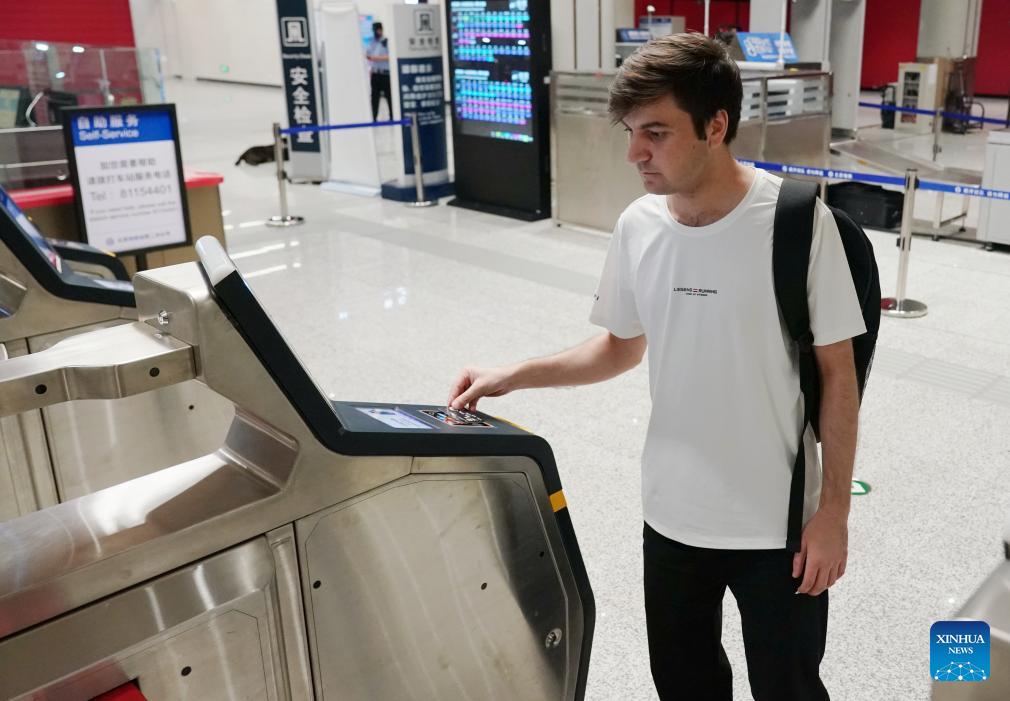еҸӮиҖғж¶ҲжҒҜ

Beijing subway enables payment by foreign bank cards

James Patrick from Canada experiences contactless fare payments in rail transit for foreign MasterCard and Visa card holders
at the Xinshougang (Shougang Park) Subway Station in Beijing, capital of China, Sept. 13, 2024. [Photo/Xinhua]
Beijing has become the first city on the Chinese mainland to support contactless subway fare payments for foreign holders of Mastercard and Visa cards, a new measure in the city's efforts to be further open to the world.
Starting on Friday, foreign visitors can use Mastercard and Visa cards issued overseas to take all subway lines in the city, and pay smoothly according to the same billing rules as local residents.
"Previously, foreign visitors had to buy tickets with cash or use their cards at manual ticket counters. The new measure saves time and avoids the hassle of purchasing tickets," said Zhao Zilong, deputy director of the Beijing Municipal Commission of Transport.
The service is available at all gates of 490 stations along 27 subway lines, including two airport lines, the Xijiao Line and Yizhuang T1 Line, covering a total length of 836 kilometers.
Beijing has upgraded more than 20,000 pieces of equipment at subway stations to facilitate the new payment initiative, which was announced at the 2024 China International Fair for Trade in Services, held in the city last week. This is a valuable addition to payment methods that include UnionPay cards and QR codes.
"Optimizing the payment service shows Beijing's determination to continue to expand its high-level opening-up as an international center," said Wang Ying, deputy head of the financial office of the Beijing Municipal Committee of the Communist Party of China.
Chang Qing, global executive vice-president of Mastercard, said the new measure has helped Beijing become another city to successfully deploy an open public transportation ticketing system, following cities such as London and New York.
"In October, we are set to unveil a fare reduction initiative for international cardholders utilizing card swipes for entry into Beijing's subway gates," Chang said. "This will be strategically promoted in key inbound markets, aiming to enrich the experiences of foreign visitors and showcase the grandeur of Beijing as a vibrant international hub."
In addition to the new subway payment method, the city announced in August that it plans to introduce an all-in-one travel pass called the "Beijing Pass".
The pass will be a prepaid multifunctional travel card that supports payment services in buses, subways, taxis, as well as certain supermarkets and some ticket offices at tourist sites. It will be available for purchase at convenience stores at airports, train stations and subway stations.
Ronan, a French student in Beijing, said the plan to introduce an all-in-one public transportation card is a highly welcome move.
"My friends who visited Beijing couldn't use Alipay for public transportation because they didn't have Chinese phone numbers. Alipay is quite convenient for foreigners who have lived here for a while, but for foreign tourists, the new payment options will be better," he said.
Data shows that Beijing now has nearly 18,000 businesses that accept foreign cards, and all hotels rated four-star and above, as well as major cultural and tourism sites, are equipped with foreign currency exchange facilities.
From January to July, Beijing saw nearly 2 million inbound tourists, up 227.9 percent year-on-year. The number and value of mobile payments made by foreigners in Beijing in the second quarter have doubled compared with the first quarter, as business processes have been improved and payment limits adjusted.













